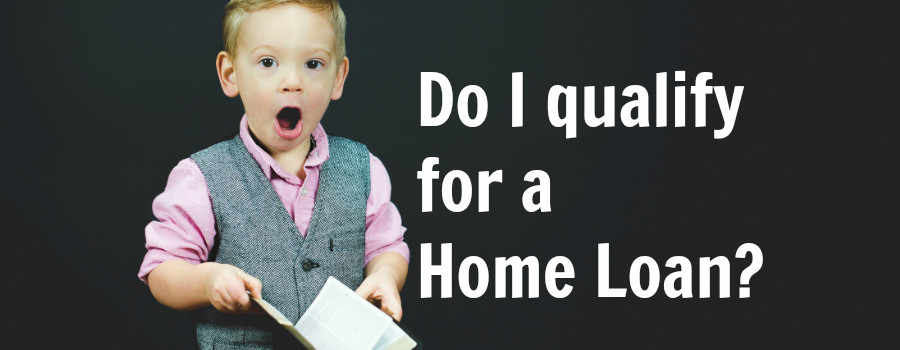Here are all the answers to the question “Do I qualify for a home loan?” The answer to that question is really a four part question regarding you income, credit, assets, and property.
The real questions to be asking are:
- Does my income qualify me for a mortgage?
- Does my credit meet mortgage requirements?
- Are my assets enough to cover the required down payment, closing costs, escrows, and reserves?
- Does the property I am looking to buy meet lender guidelines and requirements?
In this post I will cover the answers to all of those questions and more. You’ll know exactly what you’re up against when seeking mortgage approval.
Does my income qualify for a home loan?
When applying for a mortgage you have to think like an underwriter.
Regarding income, here is how an underwriter thinks: “does this potential borrower show consistency and stability with their income and employment history?”
In the mortgage world consistency is best demonstrated by providing proof of income for the most recent two year history. If your income is the same or more this year than it was last year, and the year before – that means your income is consistently increasing.
If your income is less last year than it was the year before, that means your income is “declining”. Declining income demonstrates instability, and could potentially cause an issue with approval unless there is a legitimate reason for the declining income.
If showing declining income it helps to show that you’re back on your feet by showing your year to date income is back on track to earn what you did in previous years.
W-2 employee of a company your income will be based on the gross amount on your pay stub. When you are a salary employee it’s very simple.
If you are an hourly employee your income is: your wage X average hours per week X 52 / 12.
If you recently received a raise, your income will be based on your most recent raise.
For incentive pay like commission, bonus, overtime – you will need a 2 year history of receiving that income in order to be able to demonstrate consistency/stability.
What if you are self-employed?
See full article on how your income is considered.
The way the lender decides if you’re eligible for a loan is by calculating your income and measuring that against your monthly liabilities (including all items shown on credit, alimony/child support, and all real estate obligations). The underwriter divides your debt into your income (or debt to income ratio).
So if your debt is 4,000/month and your income is 8,000/month, you have a 50% debt-to-income (DTI) ratio.
Most lenders to not like to see debt-to-income ratio above 45%, but in some cases 50% DTI is accepted with strong compensating factors (high asset reserves, low loan to value ratio, etc.).
Does my credit meet mortgage requirements?
Credit = credibility of previous payment history.
You have 1 score from each bureau:
- Transunion
- Equifax
- Experian
For a standard conventional loan, 620 middle credit score is needed. [For other loan types, there are cases where you can go as low as 500 credit score. Just ask.
So if you have scores of 650, 675, 690 – the 675 score is what is used.
Important Note: The scores that the credit bureaus report to mortgage lenders are different than what is reported to consumers who pull consumer reports. The scores that lenders see are almost always lower than what you might pull on CreditKarma.com.
CreditKarma.com is still a great site, and gives you something to start with when trying to get an idea of where you stand.
Aside from actual credit score, here are the things lenders look for on your credit report:
- On time payment history (or lack thereof – aka late payments)
- Length of credit established
- Derogatory marks like collections, charge-offs, judgments, tax liens
- Major credit events like bankruptcy, foreclosure, short sale
Payment History
It’s crucial to be able to show minimal late payments in the most recent 24 months, especially on housing payment history. Most traditional loans only allow one 30 day late payment in the last 12 months.
But there are alternative loan options for unique credit circumstances.
Length of Established Credit
In many cases there will be a need to show at least 12 months of established credit. However, there are exceptions.
If you have 10-20% down payment, >2 years on the job, and can prove rent history, it may be possible to get approved with less than 12 months credit history.
No Credit Score | No credit History
Some people just like to pay cash. Plain and simple. I get it.
For those who have no credit established, and no credit score, you may still qualify for a mortgage by using non-traditional credit approach.
A non-traditional credit report would consist of 3 accounts you pay toward that do NOT show on your traditional credit report.
Examples of non-traditional credit:
- Rental payments
- Utility payments (gas, electric, water, landline, home phone, cable)
- Netflix/HULU
- Child care
- School tuition
- Proof of 12 months savings
- Gym membership
- And more
If you have a legitimate (and consistent) 12 month payment history on an account there is a chance it may be considered by the lender in the overall decision to lend.
Derogatory Marks
For minor collections, there are cases where they do not need to be paid off prior to closing on your home loan. Medical collections are given some flexibility as well.
But if you have more than $1,000 in outstanding collections, they will most likely need to be paid prior to closing.
Judgments and tax liens must be paid prior to closing. The lender does not want to have to deal with those obligations potentially becoming a lien on the property/collateral.
These derogatory marks do not necessarily need to be removed from the credit report. Most of the time, the lender just wants legitimate proof or paper trail to confirm the obligation has been paid/satisfied/settled.
Disputed Accounts
When you dispute an account on your credit report because you disagree with the way it is being reported, the credit bureaus immediately disregard that account when calculating your scores.
The result of disputing an account is the credit scores go up. This is because the negative account that is being disputed is not being included in the overall scoring calculation.
For that reason, lenders will typically not allow a loan to proceed until the dispute has been removed, and new credit has been pulled. The logic is: if there is a disputed account, the credit scores are artificially high.
Major Credit Events
On most mortgage loans there is a waiting period between when a person has gone through a major credit event, and when they are eligible for new home financing. Below is a basic summary of what to typically expect as far as waiting periods are concerned. [there are portfolio loans where no waiting period is required]
- Bankruptcy – Chapter 7
- FHA – 2 year waiting period
- Conventional – 4 year waiting period
- VA – 2 year waiting period
- USDA – 3 year waiting period
- Portfolio Loan – No waiting period with 20% down payment if home was included in foreclosure.
- Bankruptcy – Chapter 13
- FHA – Must have 12 months on time payments and permission from trustee to enter new mortgage. Must be manually underwritten if less than 2 years.
- Conventional – 2 year waiting period
- VA – 1 year waiting period
- USDA – 1 year waiting period
- Portfolio Loan – No waiting period with 20% down payment
- Foreclosure
- FHA – 3 year waiting period
- Conventional – 7 year waiting period (Unless property that foreclosed was included in bankruptcy. If home was included in BK, waiting period is based on bankruptcy discharge date)
- VA – 3 year waiting period
- USDA – 3 year waiting period
- Portfolio Loan – No waiting period with 20% down payment
- Short Sale or Deed-in-lieu
- FHA – 3 year waiting period
- Conventional – 4 year waiting period
- VA – 3 year waiting period
- USDA – 3 year waiting period
- Portfolio Loan – No waiting period with 20% down payment
Keep in mind, guidelines change constantly. It would appear a portfolio loan is a good option if you’re back on your feet and don’t yet meet traditional waiting period requirements. More on portfolio loans here.
Do my assets meet home loan requirements?
When evaluating assets the underwriter is reviewing available funds for:
- Down payment – The amount that you’re coming out of pocket to secure the home.
- Closing costs – The fees associated with acquiring the home (appraisal, origination, title, closing, recording, etc.)
- Escrows/prepaids (for taxes and insurance) – The amount set aside to account for taxes and insurance on the property
- Reserves – The amount of left over available funds
The funds used to qualify must be “seasoned” in your account for 60 days to be eligible funds. Any large deposits that are not seasoned must be explained and sourced. Cash deposits are unacceptable because the source cannot be verified/confirmed.
If you have a property that you are simultaneously selling during the process of buying the new home, the proceeds of the sale of that previous home do not need to be seasoned. You will need to provide proof of sale of the home (purchase and sale agreement) as well as the closing statement prior to closing on the new home.
Reserves
The logic of reviewing reserves is: if the borrower should unexpectedly fall on hard times, there is enough set aside to cover the mortgage payment for X number of months.
Showing adequate reserves helps strengthen the overall file.
Reserves can be from your traditional bank account, brokerage account, retirement account, etc. You cannot use a non-borrower’s account to show reserves.
Gift Funds
For most loan types gift funds from family are acceptable. There are scenarios where a non-family member can gift the funds, but every lender is going to have a different interpretation of who is acceptable. For best results, just ask.
Non-Liquid Assets
Cars, RV’s, heavy equipment, beanie babies… are not liquid assets.
Vehicles and other items that can be easily valued, can be considered if sold and properly documented.
If you sell a car in order to qualify for a mortgage be sure to have kelly blue book value on hand, bill of sale, and copy of the check you received when you sold the vehicle. Having a full paper trail helps tremendously.
Does the property being financed meet lending guidelines?
There are an infinite number of reasons the property might not meet lender requirements.
I am going to cover some of the most common reasons the property can be the cause of denial with the lender.
Non-Warrantable Condo
When buying a condominium, not only does the borrower’s finances get evaluated, but the homeowners association is also closely reviewed.
The lender will order a “condo questionnaire” in order to evaluate the health of the association.
They’ll look for things like: completion status, investor concentration, pending litigation, and so much more.
More on non-warrantable condos here.
Repairs Needed
If the property is in disrepair, the lender will require completion of repairs prior to closing in most cases. Repairs needed will be determined based on appraiser’s comments in the appraisal report.
The repairs need to be completed by the seller, and a final inspection will be needed prior to closing to confirm completion.
If your repairs are fairly minor, there are many lenders that will allow a “repair escrow”.
A repair escrow is where funds are set aside at closing to cover the cost of the repairs needed. Then the loan closes, and repairs are done after closing. A final inspection is completed when ready.
Typically this only allowed when repairs are no more than $5,000. With a repair escrow, 150% of the estimated repair costs are collected in case of unexpected cost overages.
Example: if the repairs needed are estimated to be $3,000, the actual amount collected for the repair escrow will be $4,500.
If the excess funds aren’t used, the difference will be refunded to the borrower or applied toward the principal balance.
For properties in need of major repair. There are renovation mortgages available on both FHA and conventional.
Unique Property Type
One of the most crucial parts of the appraisal report has to do with the appraiser being able to find recently sold homes that are comparable in size/condition/use that have sold within a reasonable distance.
If there are unique features to the property, the appraiser may have a challenge that cannot be resolved due to market conditions.
Even if there are comparables, some lenders simply do not allow unique property types.
Unique features that could be a challenge:
- Berm homes
- Properties that are not suitable for year round occupancy regardless of location
- Agricultural zoned property
- Condo hotels
- More than 20 acres
- Hobby farms
- Leaseholds
- Rustic log cabins
- Working farms, ranches, or orchards
For unique property type financing, a portfolio loan may be a solution.
In Summary
There are four major pieces of the scenario to consider when asking the question “do I qualify for a home loan”?
Those pieces are: income, credit, assets, and property.
If any of your questions were left unanswered I strongly encourage you to reach out to me below and ask.
If I cannot help, I should be able to point you in the right direction at the very least.














What questions do you have?